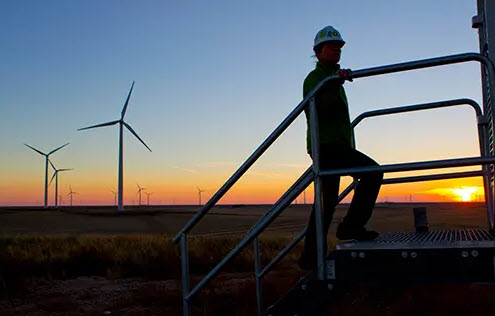
Colorado wants a complete transition to “clean” energy by 2040, the state energy office states. This goal, however, may not be feasible due to various reasons, especially not anytime soon.
Two Weld County department directors, local oil and gas workers, and the United Nations alike acknowledge the importance of ensuring energy sources are diverse and robust — all while working to reduce any negative environmental impacts.
Nick Haight, a local oil and gas lease operator, previously told the Greeley Tribune he doesn’t see petroleum going away in his lifetime, noting the dependency renewables have on fossil fuels and vice versa.
A number of oil and gas companies operating in Weld use solar panels on site to help run operations, Haight said, while working to reduce emissions and other unfavorable outcomes. Meanwhile, petroleum or petroleum byproducts may be used in the development of renewable energy projects.
Weld County director of Oil and Gas Development Jason Maxey, county Director of Planning Services Tom Parko and several third-party sources confirmed Haight’s claims.
“Different forms of energy are not independent from each other but, in fact, rely on each other,” Maxey said. “They all play into our energy mix or energy diversity, whatever you want to call it. To not acknowledge that would be an error … or to say that you can completely cut one of those out and it not affect another one, I think, is not correct.”
Solar and wind production facilities often pull power from electric grids powered by coal, oil or natural gas. Petroleum-based fuel is used to transport components for renewable energy sites as well. Additionally, as Haight pointed out, petroleum is involved in making plastic, paint and other necessary pieces found in the renewable energy sector.
On the other side, Maxey and Parko acknowledged that renewable usage has grown in the private sector and through oil and gas companies utilizing renewable energy sources on site, namely solar and wind power.
This is becoming so common the county may begin allowing these companies to develop small-sized solar farms near their drilling pads to help offset the energy they may pull from the grid. These would be separate from any renewable sources placed directly on the pad. Parko said county officials have heard positive responses from the industry on the idea.
Aside from the oil and gas industry’s investments into on-site renewables, the county has processed applications for about 15 solar facilities. Most of the solar farms are smaller, but Parko’s office expects to receive this summer the application for a 1,300-acre project near Severance. A two-phase wind farm is also scheduled for completion later this year, Parko said.
Some historically petroleum-heavy companies, such as Xcel Energy, have begun developing renewable energy sites that are completely separate from their oil or gas drilling locations in response to growing demand.
“Regardless of how you might feel about one or the other (politically), you have to count them all as dependent on each other or you wouldn’t be able to have them,” Maxey said.
Other reasons for a diverse energy portfolio
Multiple other reasons warrant continued discussion about the significance of developing a diverse energy portfolio for the future — aside from the mutual dependency between fossil fuels and renewables.
Necessary technological advances
First, the renewable energy technology is not at a level that it can completely replace oil and gas.
Science Magazine, a journal published by the American Association for the Advancement of Science, released a piece in 2019 about efforts to reduce the need for petroleum in renewables through other methods, including turning air and water molecules into fuel. Researchers admit, though, there is still quite a long way to go.
Even if the technology advances to the point that fossil fuels are not needed at all, there is a general understanding that adopting a completely renewable energy production system won’t be speedy.
The United Nations Chronicle — a magazine composed of articles by UN officials, global experts, policymakers and non-governmental organizations — released an article in 2013 about the importance of equitable energy access in light of climate change.
Authors Scott Foster and David Elzinga acknowledged the two-fold issue: the energy sector must work to combat environmental issues through emission reduction, while renewables are not in the place to replace fossil fuels. It also addressed the use of fossil fuels in the development of clean energy.
Foster is the director of the Sustainable Energy Division within the UN Economic Commission for Europe. Elzinga is the former UN Economic Affairs Officer of the same division.
“Alternative technologies that can replace current production techniques are not yet available at the scale needed, so it is expected these techniques will persist in the short- to medium-term,” Foster and Elzinga wrote. “In these cases, (carbon capture and storage) can provide a solution consistent with current demands and give the time needed to develop alternative approaches.”
Resiliency and reliability
Atmos Energy Vice President of Public Affairs Jennifer Altieri previously told the Greeley Tribune energy diversity is necessary for cost efficiency and reliability.
Greeley-Weld Habitat for Humanity partnered with Atmos to develop a zero net energy home, which is expected to produce the same amount of energy it uses in one year. The home will rely heavily on solar panels and natural gas.
Zero net energy homes are trending in homebuilding, but they’re often expensive and not accessible to many families. Many rely mainly on electricity from one source of power and cut natural gas and propane to reduce the energy impact. This single-source usage brings up concerns about reliability.
When homes, or communities, rely mostly on one type of energy production — whether that is natural gas, coal, water, wind or solar — the residents are at risk of a catastrophic power failure if the source goes down, Altieri said.
The Texas freeze this past winter that left roughly 4.5 million people without power at the height of the outage and other residents dead is an example of single-source dependency.
Officials from the Electric Reliability Council of Texas, which manages the state’s grid, said many of the state’s natural gas providers’ equipment was not designed to withstand the low temperatures and increased demand, the Texas Tribune reported.
Michael Webber, a University of Texas at Austin energy resources professor, told the Texas Tribune that all of the state’s energy resources shared the blame, but natural gas production in particular dipped significantly.
Scientific American and the Texas Tribune noted energy producers outside of the state with more diverse sources did not struggle the same way Texas did.
The weather event is also being used to promote interstate grid connectivity. Texas’ grid is mostly isolated from other states and could not source power from locations with natural gas to spare.
An analysis from the University of Calgary in Canada found similar results. Nations that rely heavily on one energy source are more likely to experience disruptions and electricity shortages; those with a strong mix are typically more secure.
Trinidad and Tobago relies heavily on its own fossil fuel production and is therefore more secure from outside market forces, but this is an exception to the rule.
“Resiliency matters, reliability of the grid matters and the reliability of every energy source, which is why it’s so important to look at a diverse energy portfolio to move us forward,” Altieri said in March. “If we’re going to move into a clean energy future, certainly here in Colorado, it’s going to take all kinds of energy to get us there.”
Economic and employment needs
The concept of energy production can be nebulous. People, understandably, may not know how everything works but want lights to come on when they flip a switch. Beyond this, though, energy source diversification has positive and tangible impacts on communities.
Parko said one major benefit for residents is land leasing for facilities. He called it a “big financial win” for Weld residents, no matter where they fall on the political spectrum, to have opportunities for land leasing through oil and gas, solar or wind.
The county recently passed new solar regulations, which were met mostly with approval from various stakeholders, but earlier drafts received a lot of criticism. Landowners said the original proposal would have made it difficult for them to lease their land to solar development companies, a decision that will help many keep their farms. The amendments approved last month fixed these concerns.
Energy diversity is also positive for the economy, Parko said. There are times when conditions may impact one source’s ability to effectively operate, such as COVID-19.
The initial shutdown last spring halted travel and the price of oil plunged. For a brief period, there was so much oil and so little demand that production companies weren’t being paid for the oil. Instead, they had to pay for storage.
Without oil demand — which is often turned into fuel — companies implemented furloughs, layoffs and bankruptcies. It is also expected to impact the Weld pocketbook next year.
Parko said in years like 2020, having renewables can help fill the economic and employment gap.
“If you have a good energy mix, then that ability to weather some of those cyclical downturns is a little bit buffered,” Parko said.
There are questions about “developing” nations wanting to tap into their fossil fuel resources to further strengthen their economy, the UN article notes. Forcing them to incur costs to develop renewables instead of utilizing what they have available can cause unnecessary tension.
Instead, there needs to be continued stakeholder discussions from “the broadest possible group” to productively address fossil fuels and renewable energy.
“Rather than a ‘non-fossil’ only agenda, a more pragmatic approach that encourages all to use the broad range of resources available to them (i.e. energy efficiency, renewables and fossil fuels in a sustainable manner) will create a more balanced approach,” the UN article states.
Weld County is known for oil and gas, producing roughly 96% of Colorado’s crude oil. Maxey and Parko believe the county is an example of this pragmatic approach. They are pleased with the increased investments in alternative energy source and technological advancements that are limiting negative impacts by fossil fuels.
“I think it’s a balanced approach here in the county,” Parko said. “As you know, we have an abundant supply of oil and gas here, but we’re also embarking on a lot of changes here with solar, wind — we’ve even talked to some companies interested in doing geothermal-type energy development. Weld County is very diversified and will continue to be in the future.”



